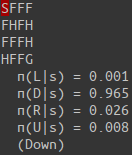FrozenLake with DDPG¶
In this notebook we solve a non-slippery version of the FrozenLake-v0 environment using a DDPG agent.
We’ll use a linear function approximator for our policy \(\pi_\theta(a|s)\) and our state-action value function \(q_\theta(s,a)\). Since the observation space is discrete, this is equivalent to the table-lookup case.

import coax
import gymnasium
import jax
import jax.numpy as jnp
import haiku as hk
import optax
# the MDP
env = gymnasium.make('FrozenLakeNonSlippery-v0')
env = coax.wrappers.TrainMonitor(env)
def func_pi(S, is_training):
logits = hk.Linear(env.action_space.n, w_init=jnp.zeros)
return {'logits': logits(S)}
def func_q(S, A, is_training):
value = hk.Sequential((hk.Flatten(), hk.Linear(1, w_init=jnp.zeros), jnp.ravel))
X = jax.vmap(jnp.kron)(S, A) # S and A are one-hot encoded
return value(X)
# function approximators
pi = coax.Policy(func_pi, env)
q = coax.Q(func_q, env)
# target networks
q_targ = q.copy()
pi_targ = pi.copy()
# experience tracer
tracer = coax.reward_tracing.NStep(n=1, gamma=0.9)
buffer = coax.experience_replay.SimpleReplayBuffer(capacity=128)
# updaters
qlearning = coax.td_learning.QLearning(q, pi_targ, q_targ, optimizer=optax.adam(0.02))
determ_pg = coax.policy_objectives.DeterministicPG(pi, q, optimizer=optax.adam(0.01))
# train
for ep in range(500):
s, info = env.reset()
for t in range(env.spec.max_episode_steps):
a = pi(s)
s_next, r, done, truncated, info = env.step(a)
# small incentive to keep moving
if jnp.array_equal(s_next, s):
r = -0.01
# update
tracer.add(s, a, r, done or truncated)
while tracer:
buffer.add(tracer.pop())
if len(buffer) == buffer.capacity:
transition_batch = buffer.sample(batch_size=16)
determ_pg.update(transition_batch)
qlearning.update(transition_batch)
# sync copies
q_targ.soft_update(q, tau=0.01)
pi_targ.soft_update(pi, tau=0.01)
if done or truncated:
break
s = s_next
# early stopping
if env.avg_G > env.spec.reward_threshold:
break
# run env one more time to render
s, info = env.reset()
env.render()
for t in range(env.spec.max_episode_steps):
# print individual action probabilities
params = pi.dist_params(s)
propensities = jax.nn.softmax(params['logits'])
for i, p in enumerate(propensities):
print(" π({:s}|s) = {:.3f}".format('LDRU'[i], p))
for i, q_ in enumerate(q(s)):
print(" q(s,{:s}) = {:.3f}".format('LDRU'[i], q_))
a = pi.mode(s)
s, r, done, truncated, info = env.step(a)
env.render()
if done or truncated:
break
if env.avg_G < env.spec.reward_threshold:
name = globals().get('__file__', 'this script')
raise RuntimeError(f"{name} failed to reach env.spec.reward_threshold")